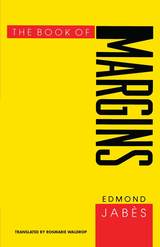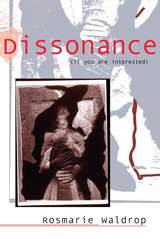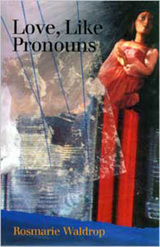4 books about Waldrop, Rosmarie

The Book of Margins
Edmond Jabès
University of Chicago Press, 1993
The death of Edmond Jabès in January 1991 silenced one of the most compelling voices of the postmodern, post-Holocaust era. Jabès's importance as a thinker, philosopher, and Jewish theologian cannot be overestimated, and his enigmatic style—combining aphorism, fictional dialogue, prose meditation, poetry, and other forms—holds special appeal for postmodern sensibilities.
In The Book of Margins, his most critical as well as most accessible book, Jabès is again concerned with the questions that inform all of his work: the nature of writing, of silence, of God and the Book. Jabès considers the work of several of his contemporaries, including Georges Bataille, Maurice Blanchot, Roger Caillois, Paul Celan, Jacques Derrida, Michel Leiris, Emmanuel Lévinas, Pier Paolo Pasolini, and his translator, Rosmarie Waldrop. This book will be important reading for students of Jewish literature, French literature, and literature of the modern and postmodern ages.
Born in Cairo in 1912, Edmond Jabès lived in France from 1956 until his death in 1991. His extensively translated and widely honored works include The Book of Questions and The Book of Shares. Both of these were translated into English by Rosmarie Waldrop, who is also a poet.
Religion and Postmodernism series
In The Book of Margins, his most critical as well as most accessible book, Jabès is again concerned with the questions that inform all of his work: the nature of writing, of silence, of God and the Book. Jabès considers the work of several of his contemporaries, including Georges Bataille, Maurice Blanchot, Roger Caillois, Paul Celan, Jacques Derrida, Michel Leiris, Emmanuel Lévinas, Pier Paolo Pasolini, and his translator, Rosmarie Waldrop. This book will be important reading for students of Jewish literature, French literature, and literature of the modern and postmodern ages.
Born in Cairo in 1912, Edmond Jabès lived in France from 1956 until his death in 1991. His extensively translated and widely honored works include The Book of Questions and The Book of Shares. Both of these were translated into English by Rosmarie Waldrop, who is also a poet.
Religion and Postmodernism series
[more]

The Book of Shares
Edmond Jabès
University of Chicago Press, 1989
As we approach sharing let us ask: "What belongs to me?"
Balance sheet of a life ratified by death.
Whatever exists has no existence unless shared.
Possessions under seal are lost possessions.
At first sight, giving, offering yourself in order to receive an equivalent gift in return, would seem to be ideal sharing.
But can All be divided?
Can a feeling, a book, a life be shared entirely?
On the other hand, if we cannot share all, what remains and will always remain outside sharing? What has never, at the heart of our possessions, been ours?
And what if we can share the vital desire to share, our only means of escape from solitude, from nothingness?
Balance sheet of a life ratified by death.
Whatever exists has no existence unless shared.
Possessions under seal are lost possessions.
At first sight, giving, offering yourself in order to receive an equivalent gift in return, would seem to be ideal sharing.
But can All be divided?
Can a feeling, a book, a life be shared entirely?
On the other hand, if we cannot share all, what remains and will always remain outside sharing? What has never, at the heart of our possessions, been ours?
And what if we can share the vital desire to share, our only means of escape from solitude, from nothingness?
[more]

Dissonance (if you are interested)
Rosmarie Waldrop
University of Alabama Press, 2005
Incisive essays on modern poetry and translation by a noted poet, translator, and critic.
As an immigrant to the United States from Germany, Rosmarie Waldrop has wrestled with the problems of language posed by the discrepancies between her native and adopted tongues, and the problems of translating from one to the other. Those discrepancies and disjunctions, instead of posing problems to be overcome, have become for Waldrop a generative force and the very foundation of her interests as a critic and poet.
In this comprehensive collection of her essays, Waldrop addresses considerations central to her life’s work: typical genres and ways of countering the conventions of genre; how concrete poets have made syntax spatial rather than grammatical; and the move away from metaphor in poetry toward contiguity and metonymy. Three essays on translation struggle with the sources and targets of translation, of the degree of strangeness or foreignness a translator should allow into any English translation. Finally, other essays examine the two-way traffic between reading and writing, and Waldrop’s notion of reading as experience.
In this comprehensive collection of her essays, Waldrop addresses considerations central to her life’s work: typical genres and ways of countering the conventions of genre; how concrete poets have made syntax spatial rather than grammatical; and the move away from metaphor in poetry toward contiguity and metonymy. Three essays on translation struggle with the sources and targets of translation, of the degree of strangeness or foreignness a translator should allow into any English translation. Finally, other essays examine the two-way traffic between reading and writing, and Waldrop’s notion of reading as experience.
[more]

Love, Like Pronouns
Rosmarie Waldrop
Omnidawn, 2003
With the title of her latest collection, Love, Like Pronouns, Waldrop demonstrates with deft humor the relational aspects of any discourse. And, she implicitly suggests the similar slipperiness in human emotion and in human speech, as both the love object and the pronoun's referent easily shift with, even because of any attempt to articulate it. The title also subtly resonates with Waldrop's admiration for other writers, as well as demonstrates her awareness that each act of writing occurs in relation to—and within—the environment of other writings, past and present. In this collection, poem cycles dedicated to other writers echo with subtle synchronisms of that writer's forms, tones, textures. Yet from out of this synchronism, Waldrop evolves her own unique mediums of address. Each poem travels its own distinct and unrepeatable conduit between experience and language. Waldrop is an accomplished and applauded writer of poetry, fiction, essays and translation.
[more]
READERS
Browse our collection.
PUBLISHERS
See BiblioVault's publisher services.
STUDENT SERVICES
Files for college accessibility offices.
UChicago Accessibility Resources
home | accessibility | search | about | contact us
BiblioVault ® 2001 - 2024
The University of Chicago Press









